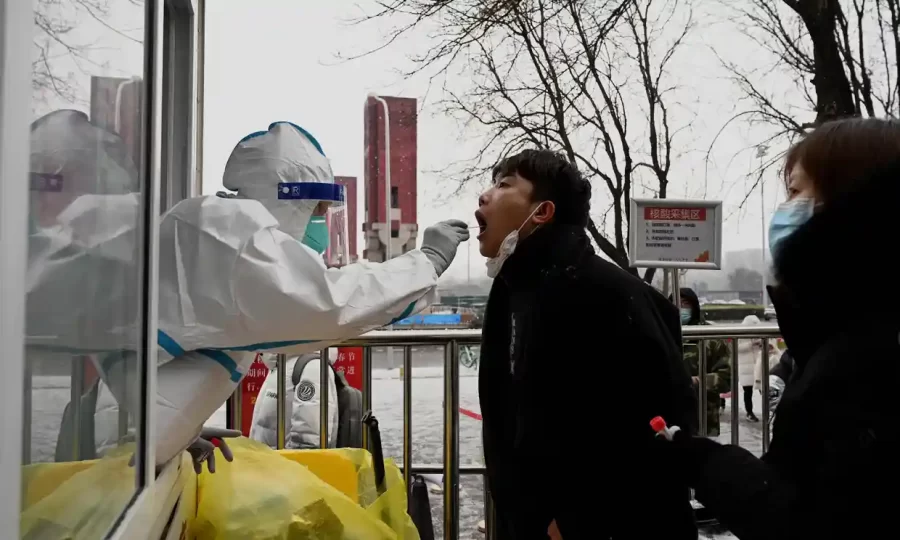No Covid Allowed!
China Seeks to eliminate all Covid from within their borders
Beijing has reported fewer than 10 cases of the Delta and Omicron variants since 15 January.
Since the initial surge of the COVID-19 pandemic in China, the nation has implemented a strict, zero-COVID policy, which has involved abrupt shutdowns in certain regions whenever an outbreak has been detected. Recently, however, questions have been raised about the policy’s feasibility, both pertaining to its implications for the people of China and the world in general, as the upcoming Winter Olympics loom.
The premise of the nation’s COVID-19 policy is based on the notion that areas with outbreaks should be cut off from the outside world until their cases are under control enough that they would not pose the risk of igniting a larger pandemic spike. This has involved the sudden and strict lockdowns of affected regions, entailing the availability of a bare minimum of in-person services, strictly enforced quarantines, and the extreme limitations of transportation to and from the quarantined region.
While many acknowledge its short-term success in containing the virus to low levels unseen elsewhere in the world, an argument has started to gain traction that, by keeping this policy, the nation is priming itself for a disastrous and deadly surge of the virus. The Chinese vaccine, SinoVac, has proved to be much less effective than other vaccines, and when the nation faces an uncontrollable surge, which some say is inevitable given upcoming events like the Winter Olympics, the nation’s collective lack of high immunity may prove detrimental. Albuquerque Academy History teacher Haley Brill, who was in China for much of spring 2020, summed up the nation’s policy nicely. She mentioned that, at its face, the policy has actually been “quite successful in controlling the number of cases thus far”. However, she reiterated that, if a surge were to suddenly spiral out of control, the population would be at a heightened risk, due to the lower efficacy of Chinese vaccines.
Economically, the nation that seems to be suffering the most, at least in the big picture, is China. The entire Chinese domestic supply chain has been repeatedly disrupted by these flash lockdowns. As ports across the Chinese coast shut down to help control the virus, large volumes of cargo have either been diverted into aviation routes or concentrated in a handful of ports. This has not only led to delays but also a heavy stress on those ports and air routes. Some economists have concluded that a continuation of the policy could slow China’s economy and lead to detrimental effects on its efficiency and productivity. Brill added that the nation has seen “slowing growth” coming out of areas affected by these lockdowns and that a prime long-term consequence of this policy continuing could be an “economic decline” for the nation, which had previously been on the rise before the pandemic hit the world two years ago. China’s role in the global supply chain means that businesses, including those in the United States, often depend on production and manufacturing in China, which have been shuttered by the pandemic, meaning that the United States economy has also suffered at times when the policy has been implemented the most.
Chinese President Xi Jinping’s credibility could be at stake both within and outside of his borders. The President has used this policy as a way to seem bold and have a solid grip on his nation and the virus. However, as the Winter Olympics approach amid the Omicron surge, Xi’s show of fortitude could be on the line. A sudden spike in China could shake President Xi’s carefully-curated image as he tries to launch China forward as a leading global power. The continued use of the policy could lead to the further eroding of the United States-China relationship already thinned out by Former President Trump’s trade wars and other world issues, like the rise of North Korea and the reports out of China’s Xinjiang province that have indicated a devastating government-run abuse of the ethnic minority Uyghur Muslims. Ms. Brill said that while the Chinese people have seemed to be “relatively satisfied with the current political order” due to an “improving quality of life”, particularly in larger cities that have more access to popular goods, the dragging on of these types of policies could have the potential to upset this delicate balance. Many have lacked access to services during these flash lockdowns, most recently in the city of Xi’an, which experienced a lack of food when the city shut down at the start of this year. Lockdowns like these, Ms. Brill said, have the “potential to change not only the social mood of the Chinese people over time but also the global image of President Xi Jinping”. Brill also mentioned that the lockdowns are helping to “conceal the Xinjiang region, home to the heavily-marginalized Uyghur Muslims, from foreigners”. The region has long been under a strict lockdown that has restricted outside access, meaning that any continuation or termination of these policies can have consequential impacts on the relations between China and the west, who have heavily criticized abuses of the group.
In the short term, though, the rise of both the Omicron variant and the Zero-COVID policy ahead of the Winter Olympics has led many to question whether this policy will hold off a dreaded covid surge or backfire and result in a large magnitude of cases and deaths. The answer will affect the future not only of this policy, but of the Chinese and global economy and the domestic and foreign image of President Xi Jinping.

Abhishek is a deeply engaged member of the Albuquerque Academy community, part of several government and politics-focused clubs and activities. For the...







